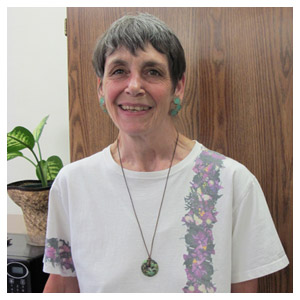This is the fifth of a series of posts that discuss how possible changes in Social Security will affect the residents of Champaign-Urbana, Illinois. The entire series is archived here.
“I am so ready to be a drawer on early Social Security,” sixty-one year old Jennifer Putman told me. This month she turned sixty-two and visited her local Social Security office to sign up. Putman is not unusual. More than half of all the program’s beneficiaries take their benefits early, even if it means a drastically reduced benefit for the rest of their lives. For someone Putman’s age, that means a reduction of 25 percent from her full benefit. In dollars and cents that means her monthly payment will now be about $913.
 That reduction is okay with her because she says she needs it to pay for her health insurance, a huge looming cost for many people her age. Nine years ago she suffered a spinal cord injury, the result of a bathroom fall. She eventually recovered, but was left with permanent neurological deficits that, of course, make her unacceptable to insurance companies that can still decline coverage to those with preexisting conditions. Her movements are not well coordinated, and she needs a walker to get around. But she can sit in front of a keyboard and talk on the phone, and that qualifies her for office work.
That reduction is okay with her because she says she needs it to pay for her health insurance, a huge looming cost for many people her age. Nine years ago she suffered a spinal cord injury, the result of a bathroom fall. She eventually recovered, but was left with permanent neurological deficits that, of course, make her unacceptable to insurance companies that can still decline coverage to those with preexisting conditions. Her movements are not well coordinated, and she needs a walker to get around. But she can sit in front of a keyboard and talk on the phone, and that qualifies her for office work.
She now works sixteen hours a week as an office assistant at a local non-profit organization that provides dental care to families with low incomes. She calls the families and sets up appointments, bringing home $312 every two weeks. It offers no benefits. “My supervisor can’t afford to increase my hours,” she told me. “This is a shoestring non-profit.” She said that businesses like this would rather hire an intern for free than increase the hours of people already working. Her $221 a week unemployment benefit will end soon.
“I like what I do and hope to continue working indefinitely. I think the employment will continue, although I don’t think anyone can say they have job security,” she said.
She’s had some experience with that. Until two years ago she was a college textbook editor, but was laid off when the economic downturn hit Champaign. She had been an editor for twenty years, and says the most she made on that job was $11.30 an hour. But the job offered health insurance. For awhile she benefited from the government’s subsidy for COBRA coverage provided by the stimulus legislation. But when that dried up, Putman, like millions of others, had to find new insurance and pay a lot more for it.
Because of her preexisting health conditions, her quest for coverage led to the Illinois Comprehensive Health Insurance Plan, a state program for residents who can’t get insurance because of health problems, or whose current premiums are higher than the premiums the program charges. She chose a plan with a $2000 deductible and a monthly premium of $542. “If I didn’t take Social Security, I don’t see how I could come up with the $540,” Putman said. Still, the premium eats up about sixty percent of the benefit.
What about the consequences of having a reduced benefit when she no longer works, I asked? Wouldn’t that affect her standard of living? It’s likely that even with Medicare, her out-of-pocket expenses for health insurance and other care won’t go down. “I think I need the money right now.” She said she was lucky and had a cushion for retirement, a $300,000 inheritance from her parents who both had academic jobs.
“I’ll sell some assets to live on,” she said. Or, she theorized, “There’s still a possibility I could earn more money if I found another job for twenty-five hours a week.” Social Security experts say that too often people like Putman take their benefits early, but by the time they reach their seventies and eighties when other assets are used up, they often struggle on what has become an inadequate Social Security benefit. They don’t think about that in their early sixties.
Putman knew a fair amount about Social Security. “It’s part of the intergenerational compact people of our generation made by willingly contributing to support our parents and grandparents,” she said. “I hope the younger people will help me in turn.” As for raising the retirement age to seventy, she said she had heard some talk about that. “I don’t think it’s a good thing, but it might be a necessary thing.” If it turns out that the retirement age for full benefits is raised, those like Putman who take their benefits early will find that a benefit taken early will be reduced even more than it is today—a point I will discuss in another post later this week.
Click here for more from Trudy Lieberman on Social Security and entitlement reform.
Trudy Lieberman is a longtime contributing editor to the Columbia Journalism Review. She is the lead writer for CJR's Covering the Health Care Fight. She also blogs for Health News Review and the Center for Health Journalism. Follow her on Twitter @Trudy_Lieberman.
